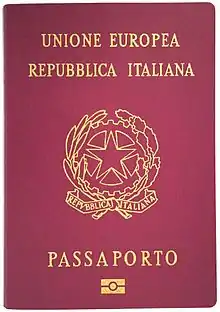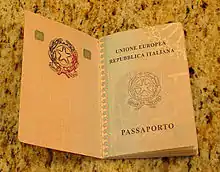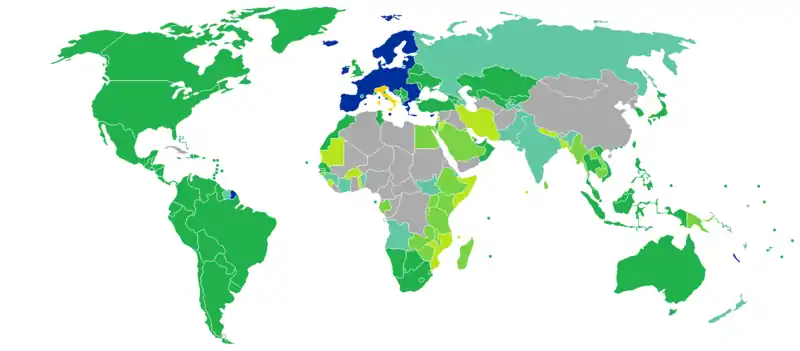Italian passport
Italian passports are issued to Italian citizens for the purpose of international travel. Biometric passports have been available since 26 October 2006, are valid for 10, 5 or 3 years (depending on the applicant's age). Every Italian citizen is also a citizen of the European Union. The passport, along with the national identity card allows for free rights of movement and residence in any of the states of the European Union, European Economic Area (which includes the United Kingdom) as well as Switzerland.
| Italian passport | |
|---|---|
 The front cover of a contemporary Italian biometric passport | |
 The biodata page of an Italian biometric passport | |
| Type | Passport |
| Issued by | |
| First issued | 26 October 2006 (biometric passport) 20 May 2010 (current version) |
| Purpose | Identification |
| Eligibility | Italian citizenship |
| Expiration | 10 years after issuance (for adults); 5 years (for minors aged 3–17); 3 years (for children aged 0–3)[1] |
| Cost | €116 |

Physical appearance
Italian passports share the common design of EU Passports: they are burgundy-coloured, with the Emblem of Italy emblazoned in the center of the front cover. The word "Passaporto", meaning passport, is inscribed below the coat of arms and "Unione Europea" (English: European Union), "Repubblica Italiana" (English: Italian Republic) above. The biometry symbol appears right below "Passaporto" in the centre. The current version of the passport contains 48 pages.[2]
Identity information page
The biodata are on page 2 of the passport, and include the following:
- Photo of Passport Holder
- Type
- Code of Issuing State (ITA)
- Passport No.
- Surname (1)
- Given Names (2)
- Nationality (3)
- Date of Birth (4)
- Sex (5)
- Place of Birth (6)
- Date of Issue (7)
- Date of Expiration (8)
- Authority (9)
- Holder's signature (10)
The information page ends with the Machine Readable Zone.
Languages
The data page is printed in Italian, English and French. Further translation is provided on page 6, in all 23 official languages of the European Union.
Visa free travel

Visa requirements for Italian citizens are administrative entry restrictions by the authorities of other states placed on citizens of Italy. As of 7 April 2020, Italian citizens had visa-free or visa on arrival access to 186 countries and territories, ranking the Italian passport 4th in terms of travel freedom (tied with Spain, Luxembourg and Finland) according to the Henley Passport Index.
Issuing
The Italian passport is issued by the Minister of Foreign Affairs, through
- Questure (State Police provincial offices) in Italy[3]
- Italian consulates and embassies abroad
However, Italian citizens can also apply through Carabinieri (Stazioni dei Carabinieri) and Police (Commissariati) offices. Since the introduction of biometric passports in 2006, applicants should appear in person at the Police offices to have fingerprints collected; children under 12 are exempt, but should appear in person nonetheless.
The current fee for a biometric passport is €116. The requirement to purchase revenue stamps annually was eliminated on 24 June 2014[4]
Multiple Passports
Italians are allowed to have two passports if they have a valid reason, such as having a stamp from a country like Israel, which may cause trouble with other countries.
One passport will have to be saved in a Questura or consulate.[5]
Gallery of historic images
 Cover of passport issued in 1901
Cover of passport issued in 1901 Cover of passport issued in 1938
Cover of passport issued in 1938 1938 Italian regular passport changed during the war to a SERVICE passport
1938 Italian regular passport changed during the war to a SERVICE passport Passport issued by the Allied-backed government of Italy from June 1944 to May 1946 — last Monarchy issue
Passport issued by the Allied-backed government of Italy from June 1944 to May 1946 — last Monarchy issue 1947 Italian Diplomatic passport used for Moscow
1947 Italian Diplomatic passport used for Moscow Cover of passport issued in 1953
Cover of passport issued in 1953 Cover of passport issued in 1966
Cover of passport issued in 1966 Cover of passport issued in 1973
Cover of passport issued in 1973 Cover of passport as issued from 1985 to 1998
Cover of passport as issued from 1985 to 1998 Cover of passport as issued from 1998 to 2006
Cover of passport as issued from 1998 to 2006 Cover of passport as issued from 2006 onwards
Cover of passport as issued from 2006 onwards
See also
References
- "Passaporto per i minori". Poliziadistato.it. Retrieved 2014-03-10.
- "Passaporti: sul sito tutte le novità | Polizia di Stato". www.poliziadistato.it. Archived from the original on 2019-07-15. Retrieved 2019-07-15.
- Law n. 1185 of 1967 (Norme sui passaporti)
- "Passport". Ministero degli Affari Esteri e della Cooperazione internazionale.
- "Doppio passaporto | Polizia di Stato". www.poliziadistato.it. Retrieved 2020-02-01.
External links
| Wikimedia Commons has media related to Passports of Italy. |
- Italian Police official site
- Passport process site
- Benefits of an Italian passport for Italian dual citizens